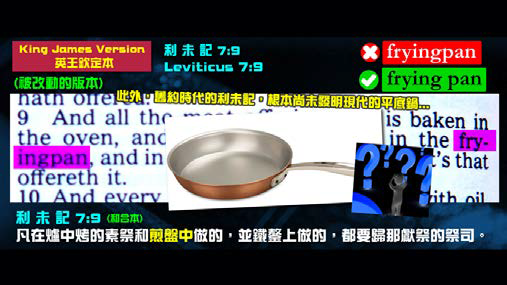今星期,我們繼續進深研究英王欽定本的「曼德拉效應」改動。
以下例子,是以現代發明的物品,取代舊約時代尚未出現的物品。
我們一起看看《利未記》有關獻祭的經文。
.
Leviticus 7:9
And all the meat offering that is baken in the oven,
and all that is dressed in the fryingpan, and in the pan,
shall be the priest's that offereth it.
這裡出現「fryingpan」平底鍋。
首先,平底鍋的正確英文串法是 frying pan,是兩個字,
而不是一個字, 現時兩個英文字放在一起,
當然就變成了錯字。 此外,《利未記》在舊約時代寫成,
當時根本尚未發明現代的平底鍋, 所以 NIV 譯本只是簡單地譯作「鍋」。
fryingpan 在《聖經》出現了兩次,兩次都是在《利未記》。
在「曼德拉效應」下,我們常常看見英王欽定本將兩個英文字組合起來,
變成一個錯字。 現在,讓我們看一段新約經文。
Colossians 2:16
Let no man therefore judge you in meat, or in drink,
or in respect of an holyday, or of the new moon, or of the sabbath days:
大家是否發覺,這裡出現了一個由兩個英文單字組成的錯字 holyday 呢?
我們再看看 NIV 譯本。
Colossians 2:16
Therefore do not let anyone judge you by what you eat or drink,
or with regard to a religious festival, a New Moon celebration or a Sabbath day.
NIV 譯本以 religious festival 形容 holy day,
但 holyday 這個錯字,在英王欽定本出現了兩次。
然而,英王欽定本的《出埃及記》曾將 holy day 清楚分開。
Exodus 35:2
Six days shall work be done,
but on the seventh day there shall be to you an holy day,
a sabbath of rest to the LORD:
whosoever doeth work therein shall be put to death. 
可見 holyday 並非獨有的宗教名詞,而是一個錯字。
又例如:《出埃及記》提到,當時的埃及人有一種器皿,
稱為摶麵盆。
出埃及記 8 章 3 節:
「河裡要滋生青蛙;這青蛙要上來進你的宮殿和你的臥房,
上你的床榻,進你臣僕的房屋,上你百 姓的身上,進你的爐竈和你的摶麵盆。」
在「曼德拉效應」下,摶麵盆變成怎樣呢?
Exodus 8:3
And the river shall bring forth frogs abundantly,
which shall go up and come into thine house, and into thy bedchamber,
and upon thy bed, and into the house of thy servants,
and upon thy people, and into thine ovens, and into thy kneadingtroughs:
這裡,摶麵盆是兩個英文字組成的錯字 kneadingtroughs。
但 NIV 譯本中,這是兩個分開寫的正確英文字。
The Nile will teem with frogs. They will come up into your palace
and your bedroom and onto your bed,
into the houses of your officials and on your people, and into your ovens and kneading troughs. 英王欽定本出現了兩次錯誤的 kneadingtroughs,代表這改變出現了兩次。
下星期,我們將會看更多英王欽定本的「曼德拉效應」改變。
Ref: 錫安日報 2012 榮耀盼望 vol.395 (20170903):












沒有留言:
張貼留言